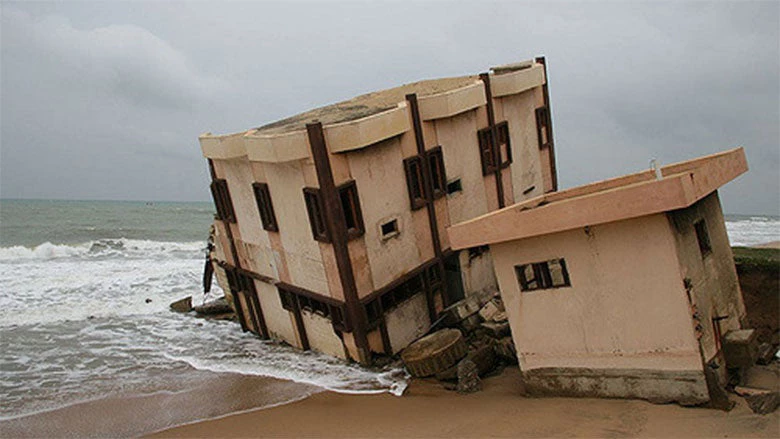
I was raised in a small town called Hornsea on England’s east coast, a magnificent place that attracts tourists but is eroding faster than the rest of Europe. Some of the impressive, clay cliffs are literally crumbling. Local roads and the old settlement and have fallen into the sea. More than once, forward-planning residents have demolished and rebuilt their houses from salvaged materials as their coast recedes.
My recent mission trip to Benin, a country that, without resilient investments, could lose much of its coastline to aggravated erosion and sea level rise, really brought to life for me why it’s so important to use our funds and donor money to finance action against climate change.
It also illustrated very clearly why we need to get the world to implement the Paris Agreement and to commit to a low-carbon future.
West Africa’s coast is where some of the world’s poorest and most vulnerable people live. As unpredictable rain patterns and rising seas exacerbate coastal erosion, they are seriously affected by the accelerating impact of climate change. I was very fortunate to see some of these effects first-hand during my visit, which was wonderfully hosted by our country office in Benin.
I visited the area of Grand Popo, which is suffering from extreme coastal erosion. This small strip of land is Benin’s coastline and, if eroded, would change the coastal dynamic with its neighbor, Togo, by extending its coastline, possibly associated maritime rights. The West African Coastal Areas (WACA) management program aims to assist countries in the Gulf of Guinea to protect their coastline.
For the past two years, the World Bank, via WACA, has been providing technical assistance in Benin to help create solutions to protect receding coasts in this very vulnerable area.
Benin knows about erosion
What impressed me was the depth of knowledge of the stakeholders and the quality of the solutions that they are developing.
Benin is striving to find the right, flexible protections that work for the West African coastline. Not only are there advanced technical solutions with sophisticated models predicting the optimum movement of sand, there is also agricultural development using market gardening to strengthen the soil. The market gardens provide income for the local community and enrich the soil with dense root systems which provide a natural, cost effective source of protection.
The benefits to the local community of this program are social and economic. It’s important for the international community, including the Bank and funders, such as the Green Climate Fund and other technical and financial partners, to support the strategic investment plan for the WACA program and Benin.
But the problems are not only coastal. Near the capital, Cotonou, community and municipal leaders showed me where, in recent years, increased river flooding has made older bridges impassable. The communities depend on these bridges to get to markets and clinics. I spoke with members of the community who worry constantly about flood surges and the risk that their homes or schools are washed away. It’s a burden no one should have to bear.
To respond to increased rainfall, the Emergency Project for Urban Environment Management (PUGEMU) is improving infrastructure and mitigating the environmental impact of flooding. Given the expected increase in flooding, the project will increase resilience, improve the welfare of communities, and promote economic growth.
Tackling floods
For example, a new, larger, more secure bridge has been built to maintain the flow of traffic and ensure a safe crossing for pedestrians across a river plain which is very susceptible to flooding.
There is more to be done, of course, but the potential of an easier commute for communities on either side of the river plain will be a great step forward for workers and schoolchildren.
Seeing firsthand the impact of climate change on local communities reinforced the importance of our work at the Bank. Our support to countries to find solutions for low emission trajectories (ranging from getting the incentives right by advocating for a price on carbon, to designing policies and using our funds to encourage investment in renewables) is essential to reduce the emissions which contribute to climate change.
We can protect the most vulnerable people and enable their communities to prosper with resilience building and adaptation to the increasing threat of climate change. The general principles around WACA, together with our work in Benin, allows us to look at development in a holistic way.
Our investment needs to be practical, owned by local communities, and not over-engineered. The expensive long-term protections like the concrete seawalls on the east coast of England where I grew up aren’t viable everywhere. These solutions can have unintended consequences for other countries and are expensive to implement.
Our client countries want cost-effective solutions that will combine resilience and flexibility as we face the uncertainties of our future climate together. To do this, we need to find ways to leverage more capital for adaptation.
I feel very proud of our work and the impact that we have, and better able to make the case for the funding that is so desperately needed.


Join the Conversation